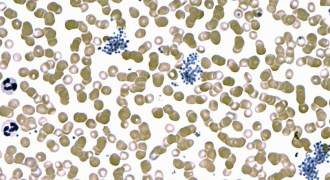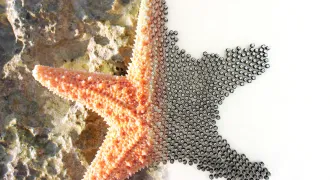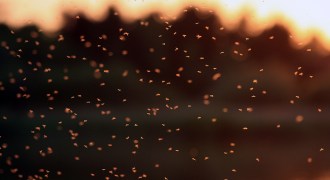Science Ticker
A roundup of research and breaking news
Sign up for our newsletter
We summarize the week's scientific breakthroughs every Thursday.
-
 Life
LifeTest drug stops Marburg virus in monkeys
Using a nano-size piece of RNA, scientists have stopped Marburg virus in monkeys.
-
 Astronomy
AstronomyChemical signature of first-generation star found
The unusual balance of elements in the atmosphere of a star most likely came from the explosion of another star more than 100 times as massive as the sun.
-
 Oceans
OceansViruses might tame some algal blooms
The rapid demise of a giant, carbon-spewing algal bloom points to the influence of viral wranglers.
-
 Animals
AnimalsOrcas and other animals may speak with complexity
From finches to orangutans, animal vocalizations may be more complex and not as distant from the structure of human language as previously thought.
-
 Life
LifeMalaria parasite’s invasion of blood cells tweezed apart
Tugging on malaria-causing parasite cells with laser optical tweezers suggest that the parasite cells interact only weakly with red blood cells and that the interactions could be disrupted with drugs or antibodies.
-
 Health & Medicine
Health & MedicineHPV vaccine protection lasts at least eight years
Immunization shields children from human papillomavirus infection for nearly a decade.
-
 Computing
ComputingThousand-robot swarm self-assembles into complex shapes
A swarm of a thousand tiny robots can now self-assemble into complex shapes, suggesting scientists have taken a step forward in engineering collective artificial intelligence
-
 Animals
AnimalsDolphins and whales may squeal with pleasure too
Dolphins and whales squeal after a food reward in about the same time it takes for dopamine to be released in the brain.
-
 Physics
PhysicsCommon motion emerges in swarms of only 10 midges
A swarm of midges may start to fly as a collective group with as few as 10 individuals, a new study shows.
-
 Neuroscience
NeuroscienceNeurons in silk scaffold mimic behaviors of a real brain
Proteins of silkworm cocoons can form the scaffold for a three-dimensional model of a brain.
-
 Physics
PhysicsLaser identifies explosive powders 400 meters away
Green laser pulse allows researchers to detect molecular vibrations in potentially explosive materials.
-
 Planetary Science
Planetary ScienceSpacecraft films Pluto’s largest moon in orbit
New Horizons spacecraft, en route to Pluto, captures nearly one orbit of dwarf planet’s largest moon.